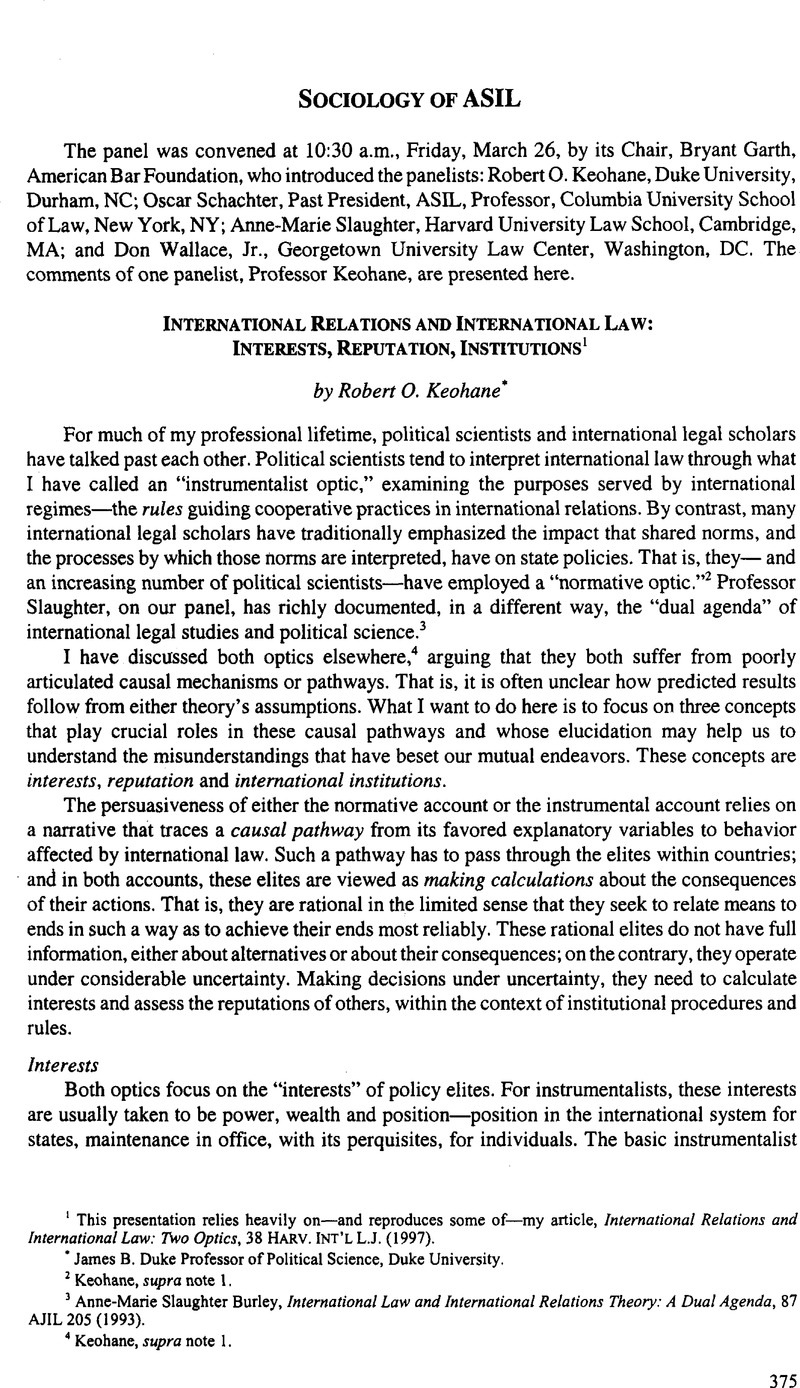Published online by Cambridge University Press: 28 February 2017

This presentation relies heavily on—and reproduces some of—my article, International Relations and International Law: Two Optics, 38 Harv. Int’l L.J. (1997).
2 Keohane, supra Note 1.
3 Burley, Anne-Marie Slaughter, International Law and International Relations Theory: A Dual Agenda, 87 AJIL 205 (1993)CrossRefGoogle Scholar.
4 Keohane, supra note 1.
5 George Downs & Stephen A. Rocke, Optimal Imperfection ch. 4 (1995); see also Downs, George, Rocke, David M. & Barsoom, Peter N., Is the Good News about Compliance Good News about Cooperation? 50 Int’l Org. 379 (1996)CrossRefGoogle Scholar.
6 Trimble, Phillip R., International Law, World Order and Critical Legal Studies, 42 Stan. L. Rev. 811, 843 (1990)CrossRefGoogle Scholar.
7 Friedrich V. Kratochwil, Rules, Norms and Decisions: On the Conditions of Practical and Legal Reasoning in International Relations and Domestic Affairs (1989). Wendt, Alexander, Anarchy is What States Make of It, 46 Int’l Org. 391 (1992)CrossRefGoogle Scholar.
8 Robert Axelrod, the Evolution of Cooperation (1984).
9 Louis Henkin, How Nations Behave: Law and Foreign Policy 52 (2nd ed., 1979), quoted approvingly by Johnstone, Ian, Treaty Interpretation: The Authority of Interpretive Communities, 12 Mich. J. Int’l L. 121 Google Scholar.
10 Kreps, David & Wilson, Robert, Reputation and Imperfect Information, 27 J. Econ. Theory 253 (1982)CrossRefGoogle Scholar. Thomas Schelling, the Strategy of Conflict (1960, 1980).
11 Heymann, Philip B., The Problem of Coordination: Bargaining and Rules, 86 Harv. L. Rev., 797, 822 (1973)CrossRefGoogle Scholar.
12 American State Papers III, 719 (1814).
13 Abram Chayes & Antonia Handler Chayes, the New Sovereignty: Compliance with International Regulatory Agreements (1995). Thomas Franck, the Power of Legitimacy Among Nations (1990).
14 Alter, Karen J., Who Are the “Masters of the Treaty”? European Governments and the European Court of Justice, 52 Int’l Org. 121 (1998)CrossRefGoogle Scholar. Mattli, Walter & Slaughter, Anne-Marie, Revisiting the European Court of Justice, 52 Int’l Org. 177(1998)CrossRefGoogle Scholar.
15 Robert O. Keohane, After Hegemony: Cooperation and Discord in the World Political Economy (1984). Martin, Lisa L., Interests, Power and Multilateralism, 46 Int’l Org. 765 (1992)CrossRefGoogle Scholar.
16 For discussions of how norms play an important role in instrumentalist, rational-choice theories, see Kreps, David, Corporate Culture and Economic Theory, in Perspectives on Positive Political Economy 90 (Alt, James E. & Shepsle, Kenneth A. eds., 1990)CrossRefGoogle Scholar. Milgrom, Paul, North, Douglass & Weingast, Barry, The Role of Institutions in the Revival of Trade, 2 Econ. & Pol. 1 (1990)CrossRefGoogle Scholar.
17 Robert Axelrod, the Evolution of Cooperation (1984). Martin, Lisa L., Interests, Power and Multilateralism, in Local Commons and Global Interdependence: Heterogeneity and Cooperation in Two Domains (Keohane, Robert O. & Ostrom, Elinor eds., 1994)Google Scholar.